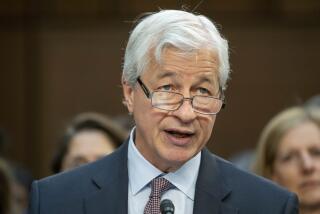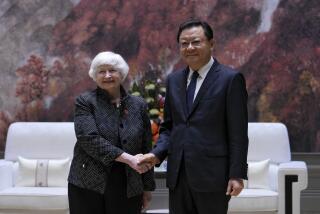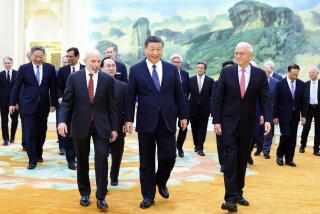Fed boss says US should cut budget deficit
The chairman of the Federal Reserve, delving into the sensitive area of global economic imbalances, warned that the U.S. and Asian nations must do more to avert the kind of uneven trade patterns underlying the recent financial crisis.
Ben S. Bernanke suggested in a speech Monday that imbalances, such as the U.S. trade deficit with China, could contribute to another financial meltdown. He also warned about the need to slash the ballooning federal budget deficit, and he encouraged U.S. citizens to save more while urging Chinese citizens to spend more.
“To achieve more balanced and durable economic growth and to reduce the risks of financial instability, we must avoid ever-increasing and unsustainable imbalances in trade and capital flows,” he said at a Santa Barbara conference on Asia and the global financial crisis.
Critics of China’s economic policies have blamed Beijing’s undervalued currency, among other factors, for fueling China’s huge trade surplus with the United States. China used that surplus to purchase massive amounts of U.S. debt, which, in turn, drove down interest rates and freed up the money for further spending by Americans.
Chinese officials have bristled at the notion that their policies caused the global financial crisis, which they and many others attribute to reckless bets on Wall Street and poor U.S. government oversight.
Still, as the U.S. and global economies begin to recover, Washington has made rebalancing the world economy a major goal, with less reliance on American consumers and more on domestic spending in countries such as China, which has built its economy on a growth model based on exports.
Bernanke noted that “strong export markets helped Asia recover” from that region’s financial collapse in 1997. And export-led growth has enabled Asian economies to rebound quickly from the current debacle, he said.
But he warned that the U.S. trade deficit with developing nations, which has eased during the recession, could swell again as the global economy recovers, threatening future growth.
He urged Asian governments to take more steps to balance global trade flows by persuading their citizens to throttle back their savings and spend more on consumer goods.
At the same time, Bernanke said, Americans must increase their savings rate, which has risen during the economic crisis but is still about half the level of the mid-1980s.
The Fed chairman also said that U.S. financial policy must be “anchored by a clear commitment to substantially reduce federal deficits over time.” The government said last week that the federal budget deficit increased to $1.4 trillion in 2009, up from $459 billion last year.
Sheldon Engler, head of Engler Economic Research, said the key questions that faced the United States were how long it would take the government to bring the deficit down to a manageable level and whether Americans would continue to increase their savings.
China, meanwhile, “has adopted many policies to encourage consumption that haven’t gotten much attention,” said Nicholas Lardy, a senior fellow at the Peterson Institute for International Economics.
The Chinese government has tried to loosen its population’s purse strings by strengthening its social safety net, thereby reducing the need for Chinese to salt money away for retirement and healthcare. For example, government pension payments were raised 10% in each of the last two years, Lardy said.
The Asian government also has taken steps to make many consumer goods more affordable. In recent months, the dollar has fallen against many major currencies, helping to lift the sale of U.S. goods overseas. But the exchange rate between the dollar and the Chinese yuan hasn’t changed in more than a year, erasing some of the advantages of a weaker greenback.
--
don.lee@latimes.com







